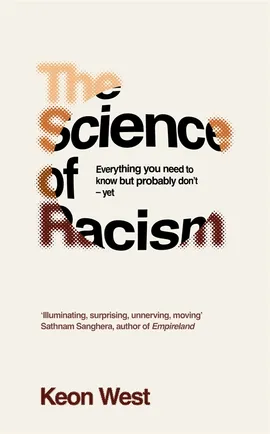Lesley Hewitt
It’s NAIDOC week (6th-13 July 2025) when we celebrate and recognize the history, culture and achievements of Aboriginal and Torres Strait Islander people – and coincidently the same week that the Northern Territory coroner, Elizabeth Armitage reported that she couldn’t rule out that racism contributed to Kumanjayi Walker’s death.
So, it was fortuitous that I picked up a copy of Keon West’s book The Science of Racism.
Professor West is a social psychologist at University College London and a visiting professor at the London School of Economics. A Rhodes Scholar, he earned his doctorate in 2010 at Oxford University and has published over 70 papers on prejudice and discrimination. West is also Black.
The book starts by defining what racism is. West asks the question “is racism still enough of a feature in our society that it has detectable, significant impacts on how people are treated and what their life outcomes are likely to be” (p.3).
Whatever your answer is, that racism does or does not have a detectable and significant impact of people’s lives, about half the population agrees with you and half does not.
So how do we get consensus about this? Do we need a consensus? West argues that there is a scientific consensus (as opposed to an opinion) that demonstrates clearly that racism does have a detectable and significant impact on people’s lives. How? The scientific model makes predications about how the world works – that’s the hypothesis – then tests it against objective, reliable, external data. If the data doesn’t match, the hypothesis fails and must change or be abandoned. There are a number of these studies that test whether racism does have an impact on lives and West gives us a summary of the science that demonstrates clearly that racism does exist and that it has an impact on relationships, employment, health care and experience of the justice system. And that that experience negatively impacts Black people. Importantly he provides references for all the studies. So, the reader can check that he has interpreted the data accurately. That alone was enough to get me reading. It was music to my ears when we’re constantly assailed with opinions, anecdotes and disinformation purporting to be fact. We don’t just have to accept that West has understood and reported accurately, we can go back to the source and see for ourselves. Most of the studies he presents are from Britain or the UK. He only refers to Australian material once and acknowledges that as a limitation. It seems to me (an opinion) that the data would be replicated here.

Of course, most people don’t want to think of themselves as racist, but the scientific data shows that we are all more racist than we think we are. Indeed, it would be hard to see how we could not be given that we live in a society that has a range of inequalities. This is implicit bias, and the book describes the range of psychological tools that we use to enable us to think more positively about ourselves. Finally West reviews the work that looks at what works in reducing this implicit bias. What doesn’t work is colour blindness, unconscious bias training, much diversity/inclusion training (mostly he says because its unregulated, untested and trainers are not qualified). What does work is cross-group friendships and collective action.
It feels an impossible task to do justice to this well written, engaging, and informative book in a brief review. West writes as though he is talking with the reader, has tasks for the reader to undertake while reading the book and acknowledges at the end that intersectionality is more complex than just considering Black/white categories. His concluding chapter, “Afterward”, acknowledges this and that the same scientific knowledge leads us to the conclusion that sexism exists. He gives the example of one of the CV studies that looked at the hierarchy of preferred applicants when CVs of equally qualified candidates were presented to participants. White men were seen as more competent and hireable, black men and white women were seen as about equally competent and hireable. Black women, despite having the same CV, were seen as less competent and hireable than all other groups.
Anyway, don’t take my word for it – read the book. It is available in our library through interlibrary loans. Paradise books can order it in. Or you can buy it at Readings Book store.
The Science of Racism; everything you need to know but probably don’t-yet by Keon West. (London, Picador, 2025. ISBN 978-1-0305- 3065-1 HB, ISBN 978-1-0350-3066-8 TPB)
Lesley Hewitt is a Daylesford resident who presents The 2nd Tuesday Book Review on Hepburn Community Radio and writes complementary reviews for The Wombat Post.





